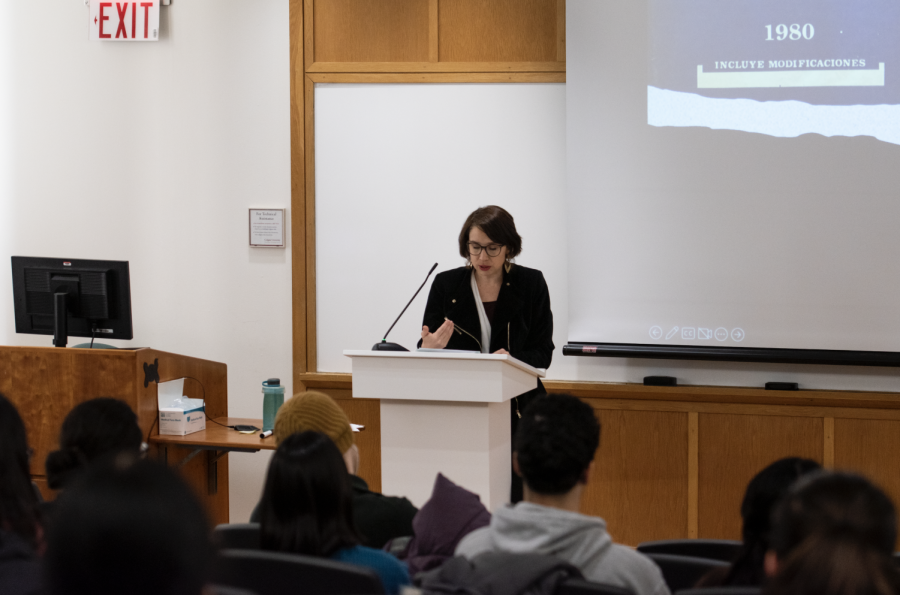History Department Hosts Discussion on ‘Gender, Politics, and Justice in Chile: Female Lawyers and the Limits of Gender Equality’
Marianne González Le Saux, Assistant Professor of Legal History and the Associate Vice Dean of Graduate Studies at the University of Chile School of Law, joined members of the Colgate University community for a discussion on gender, politics, and justice in Chile on Thursday, Feb. 2 in Persson Hall.
The event, titled “Gender, Politics, and Justice in Chile: Female Layers and the Limits of Gender Equality,” was co-hosted by Assistant Professor of History Rachel Newman, who personally knows González, as the two met during González’s first day at Columbia University.
“I’m hoping to introduce Colgate students to more fantastic scholars like Dr. González, who is based in Latin American universities and can speak to the region’s contemporary politics as well as the past,” Newman said.
During the discussion, González explained the role that female lawyers have played in the discussion of gender inequality. To represent this subject, she highlighted the stories of Adrianna Olguín de Baltra and Monica Madariaga, two female lawyers and politicians who embodied the nature of gendered legality.
González described Olguín as an “ambitious” and “politically savvy” woman. This was demonstrated through Olguín’s decline of the Chilean President’s offer to be the Ministry of Education; she preferred the role of the Ministry of Justice.
“Olguín understood that the Ministry of Education would lead her to a more feminized and thus less prestigious field of power. Instead, she pushed for the more powerful, masculine role of her own expertise which was law and justice,” González said.
After being sworn in as the Ministry of Justice in 1952, Olguín was the first female minister of Chile.
25 years after Olguín was appointed to the Ministry of Justice, Madariaga came to occupy this position. While Madariaga was the first and only female cabinet member of the military regime and successfully introduced computers, infrastructures, and the principles of new public management, Gonzalez noted that due to Madariaga’s gender, she distanced herself from the military regime’s human rights violations that were occurring at the time. She explained how women were often unwilling or unable to challenge male-dominated authority, due to pervasive power structures.
González emphasized that people should understand that gender inequality is a very complex social and legal structure that is oftentimes upheld by the ways that women exercise power.
“We all play with gender in our lives and we can see the consequences that this has in the political sphere,” González said.
The talk concluded with a Q&A session, where professors and students asked questions about gender roles in Chile.
Sophomore Jack Robinson attended the event, having heard about it from his Mexico and the United States course taught by Professor Newman, and posed a question on gender equality.
“Going forward, how can we empower women for women and not for men?” Robinson asked.
González replied that people need to veer away from the patriarchal ways of exercising power in order to empower women without relying on this masculine structure. Patriarchal structures do not only include men dominating women, but also fathers historically dominating their families. Gonzalez explains that people need to break the idea that political power is shaped by the model of the father authority.
“It is not enough to have women in power to give power to women. The access of women neither reflects nor guarantees gender equality in society,” Gonazález said.
Newman noted the successful turnout of the discussion and hopes to plan more events similar to this on campus.
“Dr. González’s talk offered powerful insights into the workings of law and power around the world. She showed us why Chilean history is both intrinsically fascinating and broadly relevant for those of us thinking about how to make the law and state tools for social justice” Newman said.











